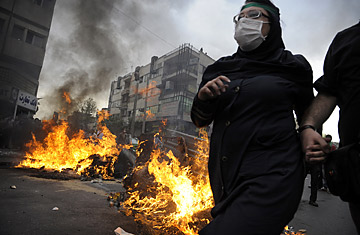
Supporters of defeated Iranian presidential candidate Mir Hossein Mousavi run past burning debris during riots in Tehran. June 13, 2009.
(2 of 2)
The Turkey-Brazil deal may not have prevented sanctions, but Iran's diplomatic position may actually be a little better now than it was a year ago. The new sanctions were expressly designed, at the insistence of Russia and China, to avoid creating significant economic pain. And the dissenting votes by Turkey and Brazil negated the desired message of international unanimity. While further unilateral sanctions are coming in the weeks ahead, China in particular remains heavily invested in Iran, and, like Russia, has made clear that it sees negotiation rather than sanctions as the key element to resolving the standoff. Indeed, the Western powers agree that the sanctions vote is aimed at enhancing the prospect for negotiations, rather than precluding them.
"Sanctions are not the endgame or the final solution," E.U. foreign policy chief Catherine Ashton said after the vote. "They are part of a dual track approach. We hope that today's decision will bring Iran back to the negotiating table." A similar message came from Secretary of State Hillary Clinton on Thursday, who emphasized the importance of further diplomacy, in which Brazil and Turkey would have a significant part.
But the reason Brazil and Turkey voted against the resolution was their belief that further sanctions in response to Iran's latest offer would harden Tehran's own position. Past patterns suggest that Iran could retreat from the Brazil-Turkey deal, and escalate matters with new moves of its own. (Just as the Western powers believe that sanctions pressure enhances their bargaining position, so does Tehran believe that expanding its uranium enrichment capabilities over the past five years has actually strengthened its own leverage.)
Having achieved the best sanctions that an international consensus will allow, the Obama Administration will now find itself pressed, by the likes of Moscow and Beijing, to return to the diplomatic track. And on that front Ahmadinejad is certainly not about to cry uncle. "The U.S. government and its allies are mistaken if they think they can brandish the stick of [sanctions] and then sit down to talk with us," Ahmadinejad said Wednesday. "Such a thing will not happen." That could just be empty bluster, of course, but Ahmadinejad knows that his domestic position is strengthened by either option being considered by the West right now — foreign pressure is a rallying point against the opposition, while negotiations enhance his prestige.
A year after the events that cast a dark shadow of doubt over his ability to govern the country, Ahmadinejad may well believe he has weathered the storm. At least for now. But while he may believe that time is on his side in his showdown with the West, his domestic opponents — taking a long view — may feel the same way.
